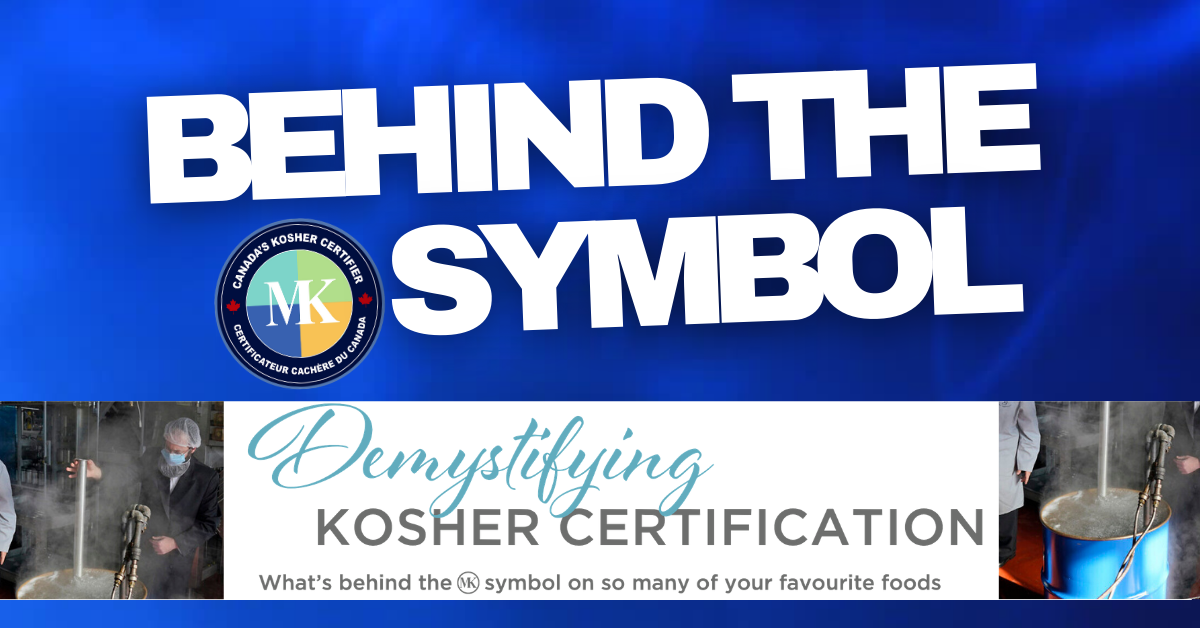
Have you ever looked closely at the packaging on your food and wondered what the little Kosher symbol on it really means? Today is your lucky day, because the dedicated team at the MK – Canada’s Kosher Certifier, is here to take the mystery out of it!
“Well, that’s easy,” says Rabbi Saul Emanuel, Director of the MK , “If there is an MK symbol on your food packaging, it means that your food is Kosher certified, and you know with absolute certainty that your food has been prepared in strict accordance with the Jewish dietary laws – the laws of Kashrut. From cookies, yogurt, chocolate, bread, lasagna to chicken chow mein – the MK symbol means it is 100% kosher.”
“That’s the really interesting part,” adds Rabbi Emanuel. “There are several steps involved in getting a product Kosher certified, and everyone at the MK has a role to play. The process is stringent, but we strive to make it as simple and straightforward as possible.”
“Before applying for Kosher certification, a food manufacturer calls me to find out what’s involved and whether their product is suitable. After all, there’s no point making an application if the product contains pork or if it’s bread made with animal-based shortening, for example!” says Judith Bergel, Account Specialist of the MK. “It’s my job to clarify exactly what kosher means to those who don’t know, to explain how making a product kosher impacts both its ingredients and its manufacturing process, and to describe the certification process to those who are interested in applying.”
FILLING OUT AN APPLICATION
“When a company decides it wants to move ahead, they begin the process by filling-out an electronic application on our website,” adds Judith. “When I receive the application, I open a file and get the ball rolling.”
SUBMITTING A LIST OF INGREDIENTS
“For a product to be considered Kosher, all of the ingredients that go into it must be Kosher. Therefore, our clients have to send us information about all the ingredients they use to manufacture their product,” explains Pearly Fuchs, from the private label & training department. “Since the information must be submitted via our online platform, either Judith or I conduct a training session with every client to make things easier for them.”
REVIEWING INGREDIENTS
“This is where Rabbi Peretz Jaffe and I come in,” says Faigie Becker, Kashrus Compliance Specialist. “We check every ingredient for verification and Kosher approval, and we help customers find alternatives if any of their ingredients don’t meet the requirements. We’re here to help and find solutions!”
UNDERGOING A FACILITIES INSPECTION
“Kosher isn’t just about what a food is made of. It’s also about how that food is made,” explains Rabbi Jaffe. “Once Faigie and I have signed-off on a product’s ingredients, the ball is back in Judith’s court. She arranges for an inspector to visit the client’s production facilities to ensure that they respect all Kosher manufacturing rules.”
SIGNING A KOSHER CERTIFICATION CONTRACT
“When a client’s facilities have passed our inspection, it’s my turn to step in,” says Estie Goldberger, Kashrus Analyst. “My job is to draw up a contract with the company, detailing all the conditions and responsibilities that come with MK Kosher certification.”
GETTING THE FINAL SEAL OF APPROVAL FROM THE CHIEF RABBI
“Rabbis, of course, play a big part in the Kosher certification process. We host a weekly meeting of the Vaad Harabanim of Montréal, which is a council made up of eight rabbis from Montréal’s various Jewish communities. They provide us with different points of view and additional guidance about the process,” explains Rabbi Emanuel. “For example, with their expertise, they can judge whether a facility’s equipment needs to be kosherized and, if so, at what temperature.” “Then, before any company can get its Kosher certification, we submit their file to Montréal’s Chief Rabbi, Rabbi Binyomin Weiss, for review,” states Rabbi Emanuel. “It’s Rabbi Weiss who gives the final seal of approval,” he adds.
OBTAINING LICENSING TO USE THE MK CERTIFICATION MARK
“Once a client has received the OK from Rabbi Weiss and signed their contract, they’re on their way,” adds Rabbi Emanuel. “We provide the client with an electronic MK certification symbol, which they can immediately add to their packaging.”
ONGOING COMPLIANCE
“The privilege of using the MK symbol comes with a lot of responsibility,” adds Rabbi Emanuel. “Every client has to adhere to the conditions set forth in their contract, and our inspectors conduct regular inspections to ensure that clients are following the MK rules.”
|
WHAT ARE THE BENEFITS OF KOSHER CERTIFICATION? |
|
“The process of getting a product certified Kosher is very rigorous and involves a lot of people. However, the benefits are tremendous, and they far outweigh any inconveniences,” states Kalman Emanuel, ’s Head of Marketing. “There’s a good reason why the Kosher food market is the fastest-growing segment of the food industry, expanding by more than 10% every year: When a product is certified Kosher, consumers know that it respects their religious dietary needs, that its ingredients meet the highest standards of quality, and that it does not contain any hidden ingredients that can trigger allergies,” concludes Kalman. “It’s just a little symbol, but it means a lot!” |